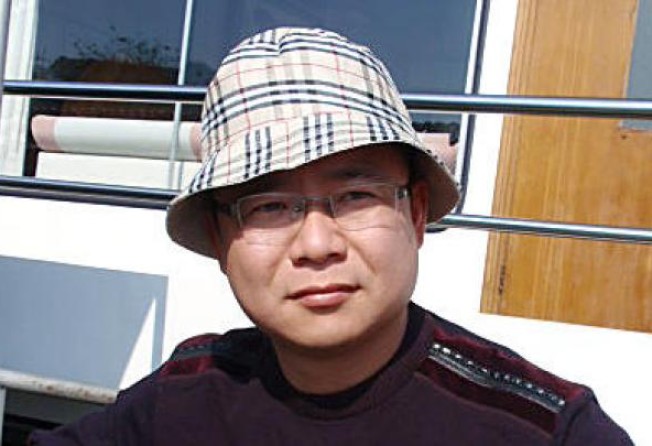Billionaire Wu Qiang looks for a safe base abroad to protect his business
For Wu Qiang, making money was easy. But how to keep his businesses safe was another worry

As one of the relatively young billionaires to have emerged during the mainland's rapid economic boom over the past decade, Wu Qiang, 37, tried his hand at several businesses before striking gold in the cement industry, which has flourished in recent years as China has tried to maintain growth through massive infrastructure projects.
Wu also ventured into microcredit loans. But a series of ups and downs is forcing Wu to consider moving abroad, where he hopes his business interests will be better protected.
Why did you choose to set up your own business in 1999 when you were 24?
I graduated from university in Jiangsu in 1997 as the Asian financial crisis was hitting. The job market was dismal. A friend introduced me to a company that sold computers, fax machines and other office equipment in Wuxi city. I stayed there for two years as a salesman, through which I gained a lot of life experience.
After that, I applied for several positions at multi-national companies, as I was seeking personal growth. But the competition was so intense - in one instance, about 2,000 people competed for a single position.
In 1999, I set up a computer company with 100,000 yuan (HK$122,500) from my father as the initial investment. I tried to copy the business model of my former employer, which brought the company decent profits. But, it turned out to be difficult for me to succeed, as I could not get goods at prices as low as my former employer.
I visited South Korea in 2000 looking for opportunities to become a sales agent for one of the big [electronics] brands, as recommended by a friend working with Samsung. I met businessmen who were interested in establishing a presence in Shanghai and the Yangtze River Delta. But they were involved in industries that didn't interest me.
With the computer business making slim profits, my father suggested that I return home to set up a cement plant with him in 2001. He had managed a government-owned cement plant for years. Returns were stable and the market seemed promising.
How is your cement business doing these days?
We invested 10 million yuan and hired 40 workers for the plant, which had an annual capacity of 300,000 tonnes in 2001. The economy was in recovery and the private economy had started to flourish. So we grabbed the chance and increased capacity.
We mainly serve clients in Jiangsu and Shanghai, where construction of office buildings, shopping malls and hotels has generated massive demand for cement. We quickly adapted to China's higher environmental standards, and we've benefited from the nation's closure of small and polluting cement factories. The more small plants that are shut down, the more businesses comes our way.
But this year has been hard. The economy has slowed a great deal, and property market curbs are still in place. Demand for cement has dipped sharply. We made a profit in the first five months before losses started in June. Since then, the situation has gotten worse.
With the cement business doing so well, why did you start a microcredit company in 2010?
The banking sector is monopolised by government-backed entities. Even Premier Wen Jiabao said earlier this year that banks make easy money because they can sit on interest under the administered interest rate regime.
To try to break the monopoly, China started allowing private companies to set up micro-lending companies that aren't allowed to take deposits. In eastern provinces, hubs for mainland entrepreneurs, the "grey" lending market is very prosperous, and lending between acquaintances, friends or through financing firms is prevalent. After considering the huge demand, several friends and I set up a microcredit company in 2010.
The economic downturn has created millions of overdue loan payments to our company. In the old days, many borrowers did not use the money for business expansion but to lend to others at higher interest rates. But with the economy cooling and banks tightening their lending, the ultimate user of the funds can't pay it back, resulting in a chain of bad debt that exacerbates the loan problem.
When we try to collect the overdue debt, local governments step in to stop us from taking the borrowers' fixed assets, to ensure plants belonging to their taxpayers aren't forced to close.
The intervention by local governments has been a headache. Once I was told to borrow money from banks and then give the money to a local government. I tried all I could to turn down this request, because I wasn't sure whether [the government] would pay it back. How should I ask for the money if the [government's] payment is overdue, and whom should I talk to after a leadership reshuffle.
What are your plans for the next three to five years?
The "real" economy [that produces goods and services] is the foundation of any country's economy, but the financial sector may bring more attractive returns sometimes. I will focus on cement in the future.
China is basically a country ruled by people, not laws, and private property is not well protected. I'm considering moving somewhere else. I may emigrate to Hong Kong because of the shared Chinese tradition and geographical proximity. I plan to buy a home in Hong Kong soon. I don't think that property prices in Hong Kong will go down substantially, as the purchasing power by affluent mainlanders is strong.
Wu spoke to Jane Cai